
Last week, we hosted Evo Fashion: Tech Talks in collaboration with Evo Learning at The Trampery Fish Island Village.
Celebrating the launch of applications for the second round of Evo Fashion, specifically tailored to fashion technology businesses, attendees found out more about the programme and specialist facilitators, experienced rapid-fire talks on all things fashion tech, and connected with industry peers.
Kicking off the evening, we heard from leading industry experts as they discussed the latest trends and developments in fashion technology. From the dynamic intersections between technology and sustainability, to delving into the realms of digital and phygital fashion, read on to find out what went down at this jam-packed evening event.
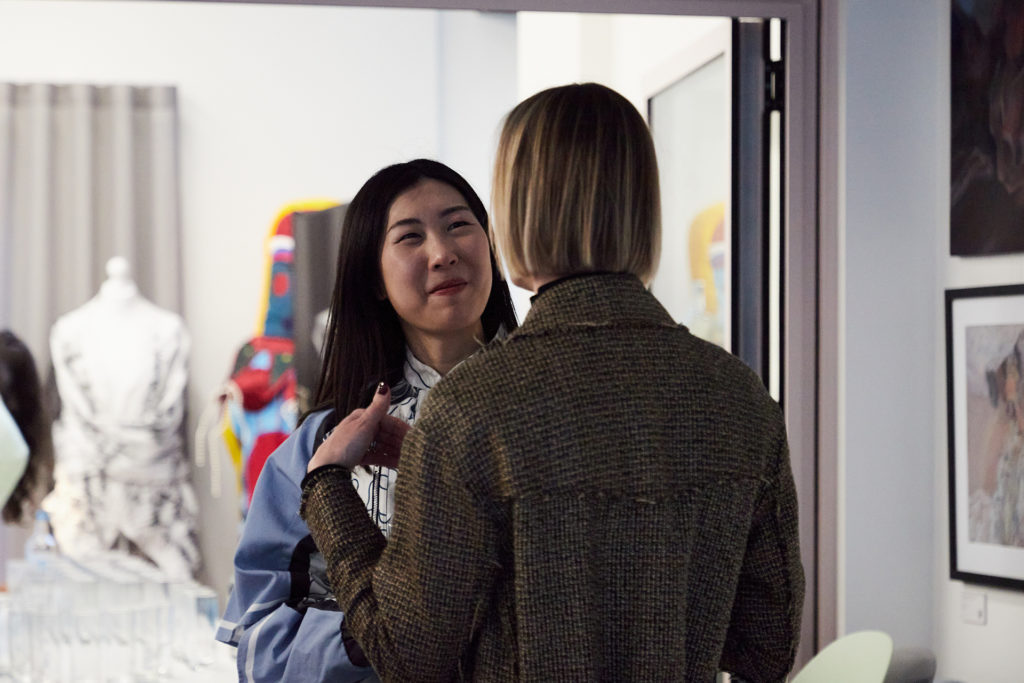
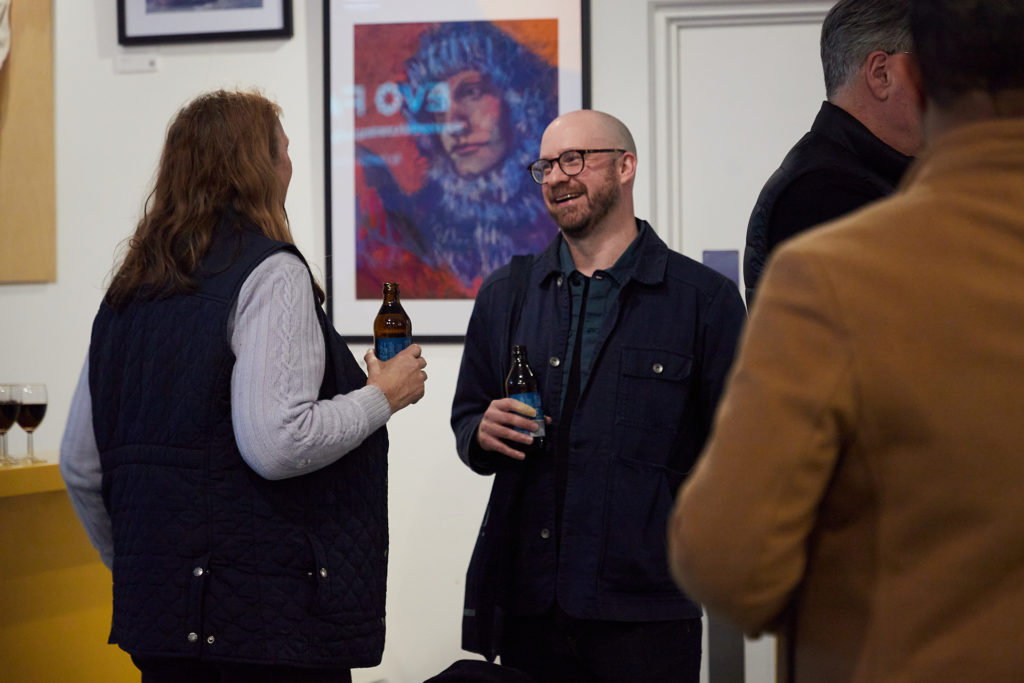
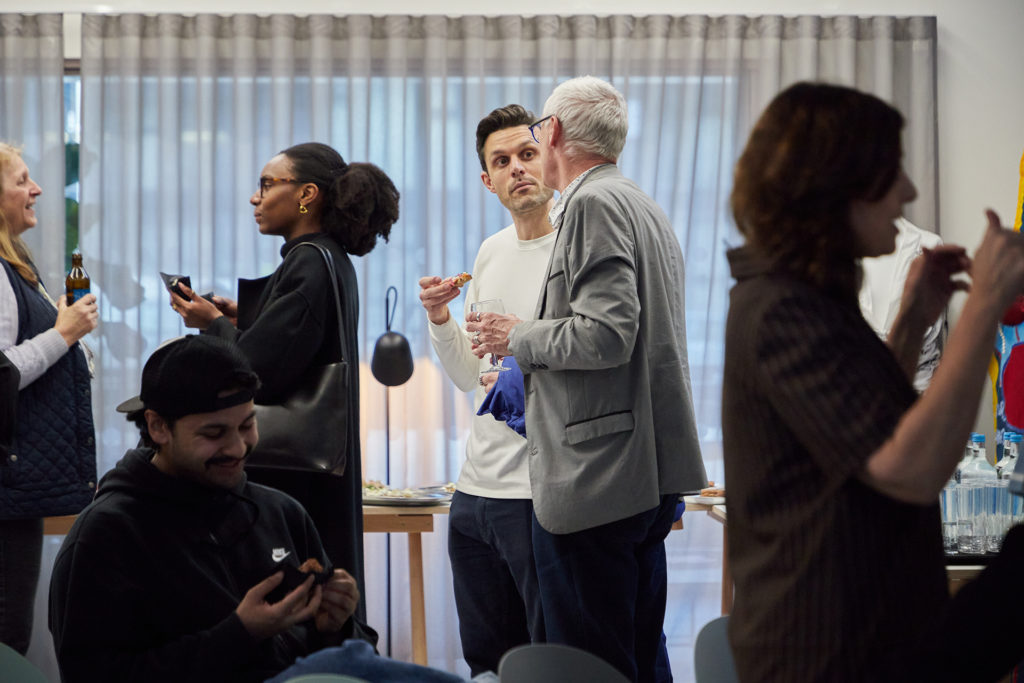
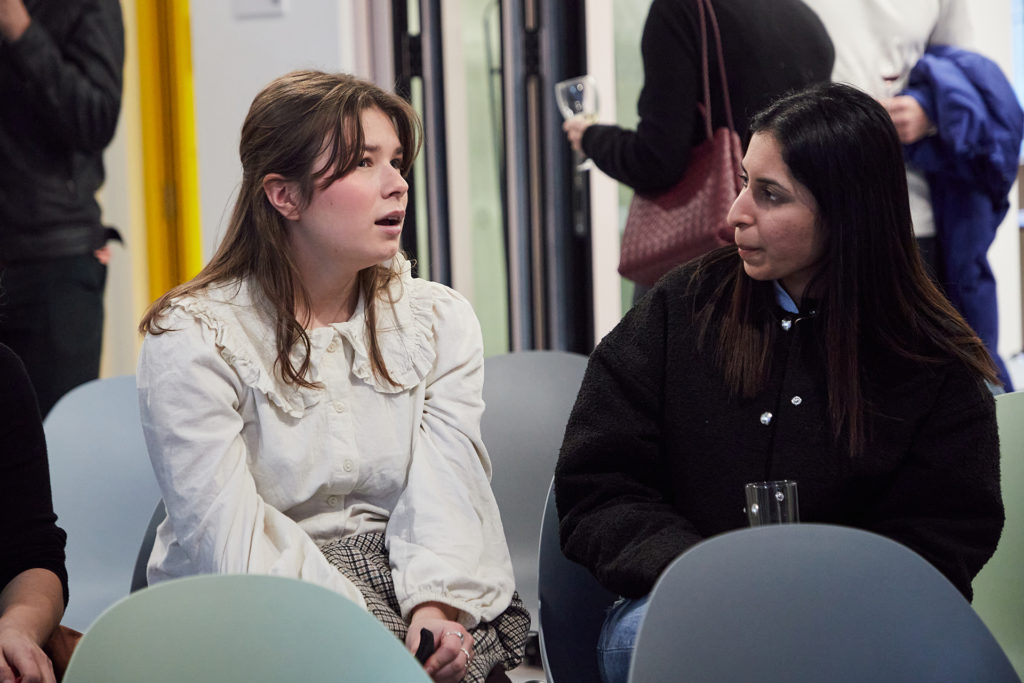
First up, Lisa Chatterton, Business Manager at Fashion Innovation Agency, took to the stage to present the latest trends in fashion tech with a focus on innovations that could support the transition towards a more sustainable fashion industry.
Speaking about the FIA’s latest work, Lisa dived into a range of topics including photogrammetry, digital humans, deepfake technology and generative AI. ‘You no longer have to fly a model up a mountain, you can do it all virtually,’ said Lisa. ‘By taking a digital asset into a virtual environment, one photoshoot can have endless possibilities.’
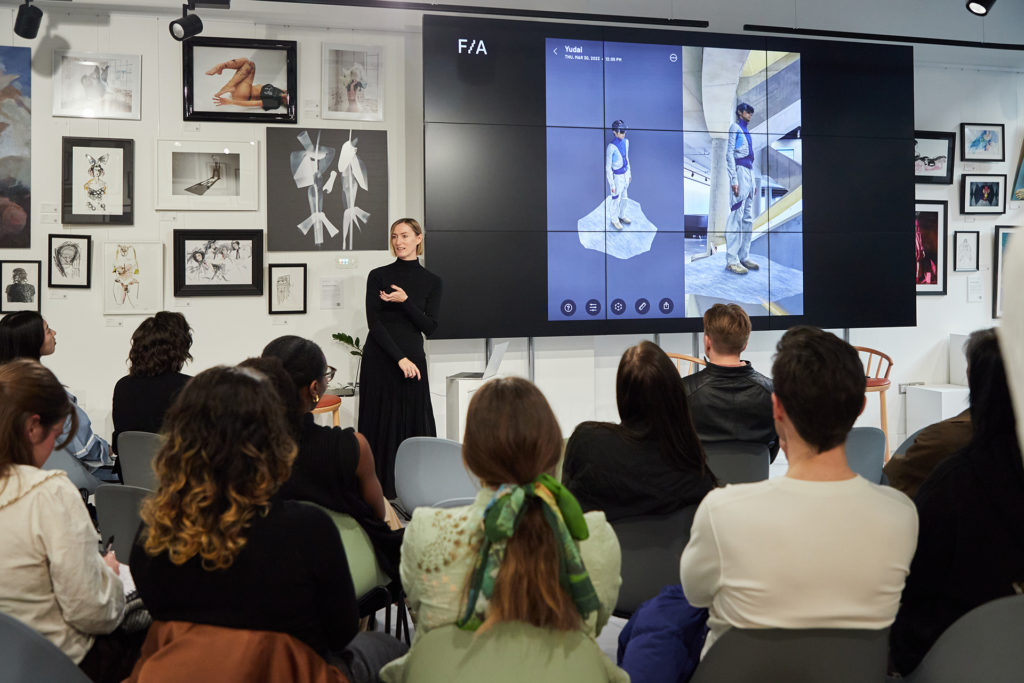
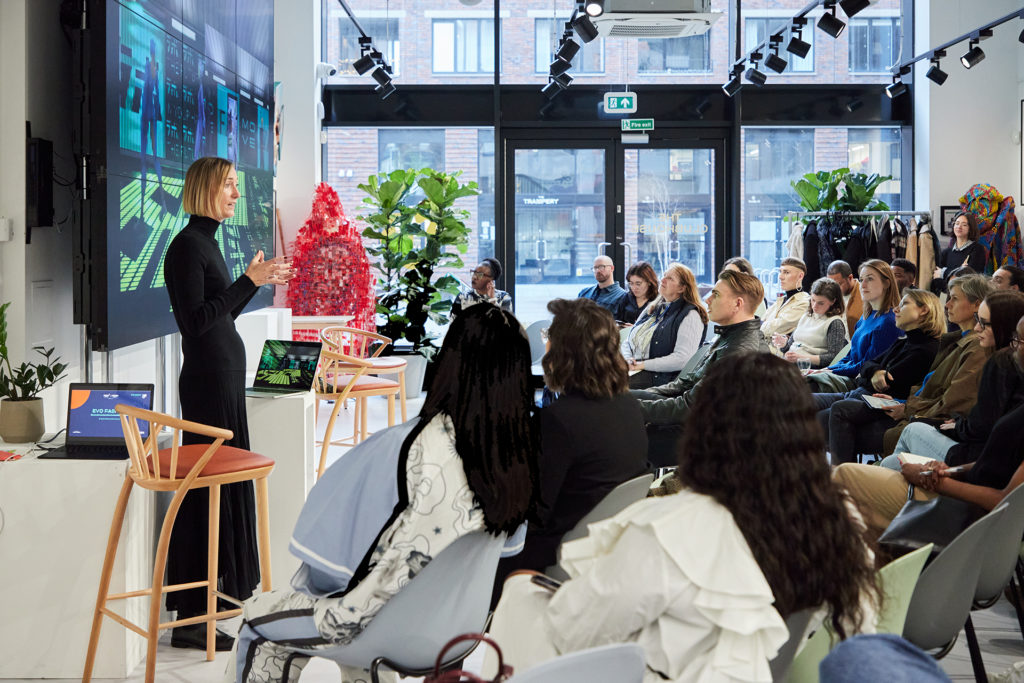
‘With digital fashion improving, exciting virtual experiences will be on the cards. This will lead to expansive fashion communication with potential for widespread impact. For example, moving beyond the walls of physical catwalk shows which are often limited to a certain number of people, designers can have real time AI generated catwalks which can be open to everyone.’
After her presentation, Lisa took questions from the audience. When asked to pick one area of technology that would be most useful for the future of the fashion industry, Lisa didn’t hesitate. ‘Generative AI is going to have the most impact,’ she told the audience. ‘As I’ve shown, it can be used as a creative tool and it can help behind the scenes. You can use it to be an expert consultant in a particular field, whereas previously you’d have to spend thousands of pounds to get that advice.’
‘I think people are nervous of AI because they don’t necessarily understand it and people think it will take their jobs. But at the same time, the genie’s out of the bottle now. If you don’t start getting your head around it and how you can deploy it within your business, you’ll get behind because everyone else will be catching up!’
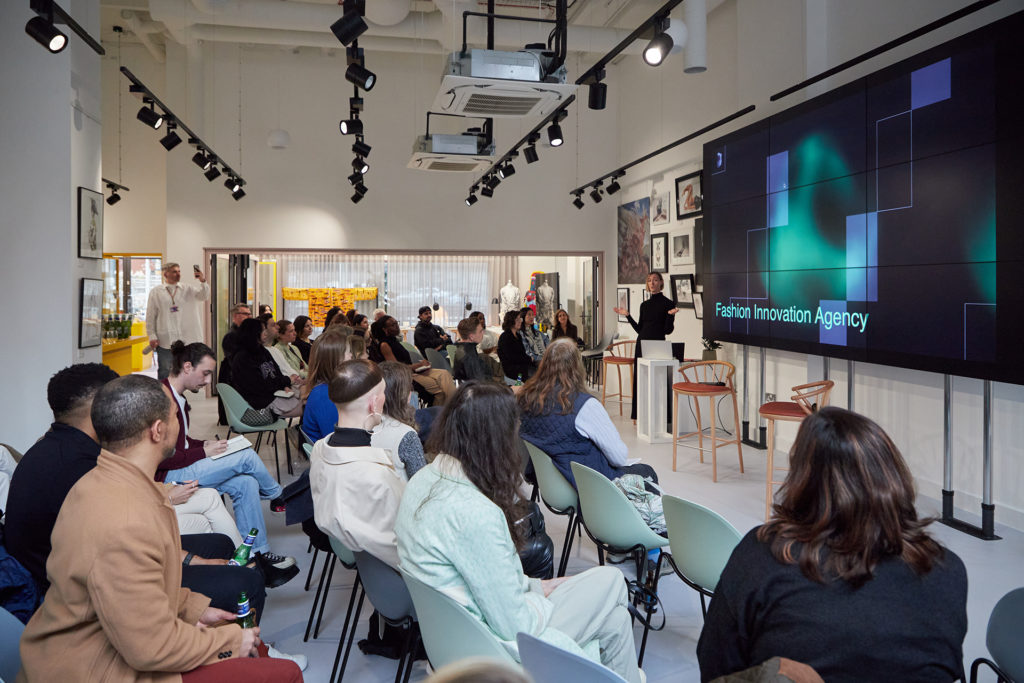
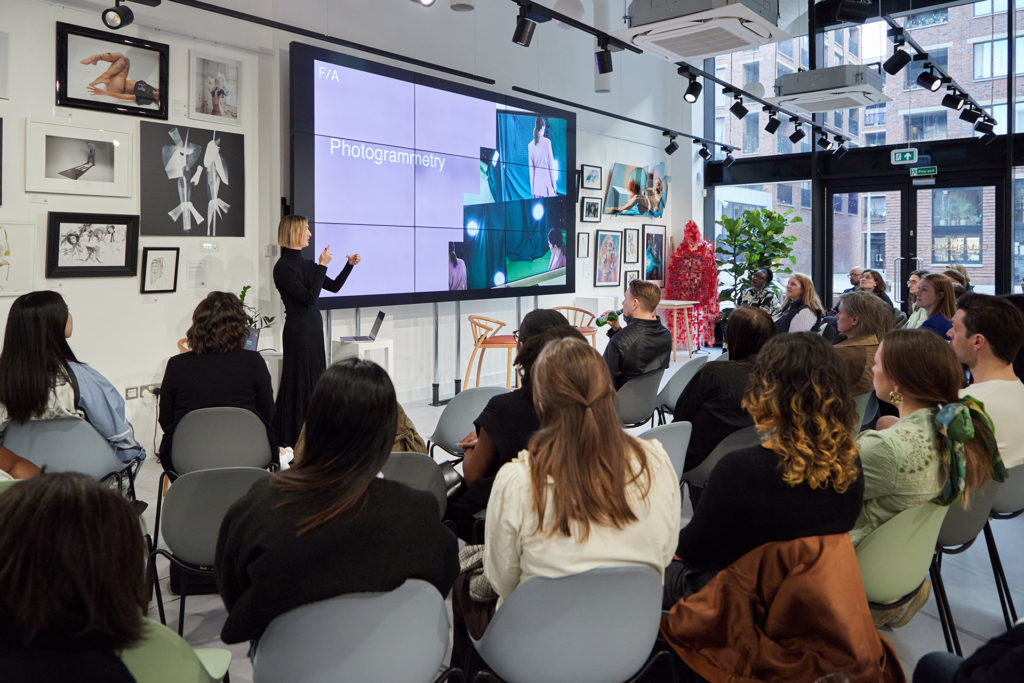
Next, Muchaneta Ten Napel, Founder of Shape Innovate, hosted a conversation with trailblazing digital artist Stephy Fung. Having just been included in Forbes 30 Under 30 list for Art and Culture, Stephy introduced herself by highlighting her USP: ‘digital first, physical second.’
Speaking about her background in graphic design, Stephy said, ‘I did not set out to become a fashion designer, but I took an interest in 3D and 3D animation. I have always naturally gravitated towards animation and storytelling. I think you can see that in my work. The clothes aren’t just garments. I like to put them in a scene and give them a ‘home.’ I love to tell a story.’
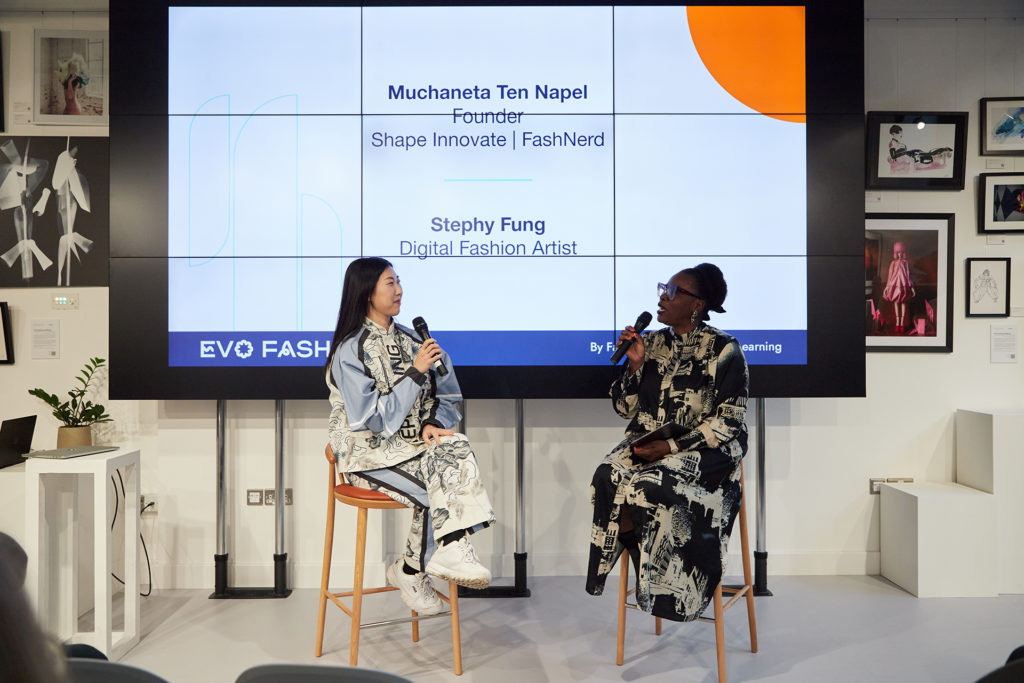
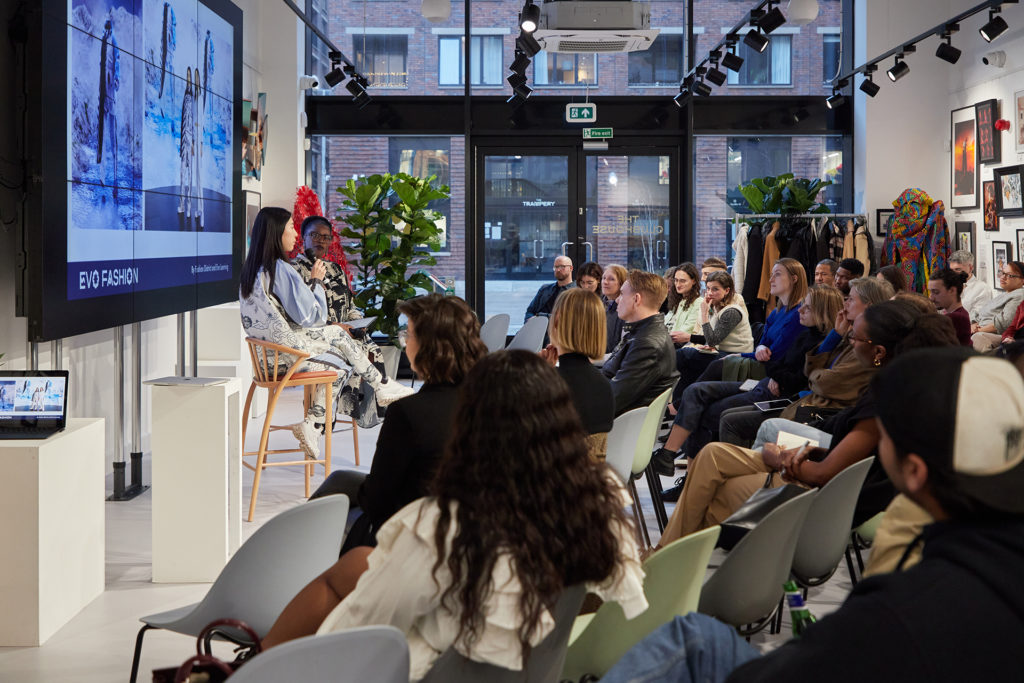
When asked by Muchaneta about challenges she’s faced in the industry, Stephy admitted she’s struggled with turning her 3D animations into physical designs. ‘I’m currently working with a company called Phygital Twin. They’ve got incredible fashion knowledge, from pattern-making to manufacturing connections. Because I don’t come from a fashion background, I need help to make my designs physical. The way I design on a programme might not necessarily work or be practical for physical production. That’s one thing that I’ve struggled with and I’ve had to learn along the way whilst working with Phygital Twin. Also, in my opinion, creating digital pieces will always be a lot cheaper compared to making physical ones, so that’s another challenge.’
In response to Muchaneta’s question about the link between digital fashion and sustainability, Stephy remarked, ‘I think a lot of brands will take on digital and replace some parts of their pipeline to speed up testing or use AI to conceptualise and visualise. Even with 3D avatars, you don’t need to get a model to come in, you can test online or change the cut, it’s a lot quicker and more efficient than the regular process.’
To wrap up the conversation, Muchaneta posed one last question. ‘What about companies who can’t afford to use digital technology, what would you recommend?’
‘There are a lot of free AI programmes out there that you can test out,’ answered Stephy. ‘Before you pay for anything, look for free programmes first and make sure to use all the free trials they offer!’
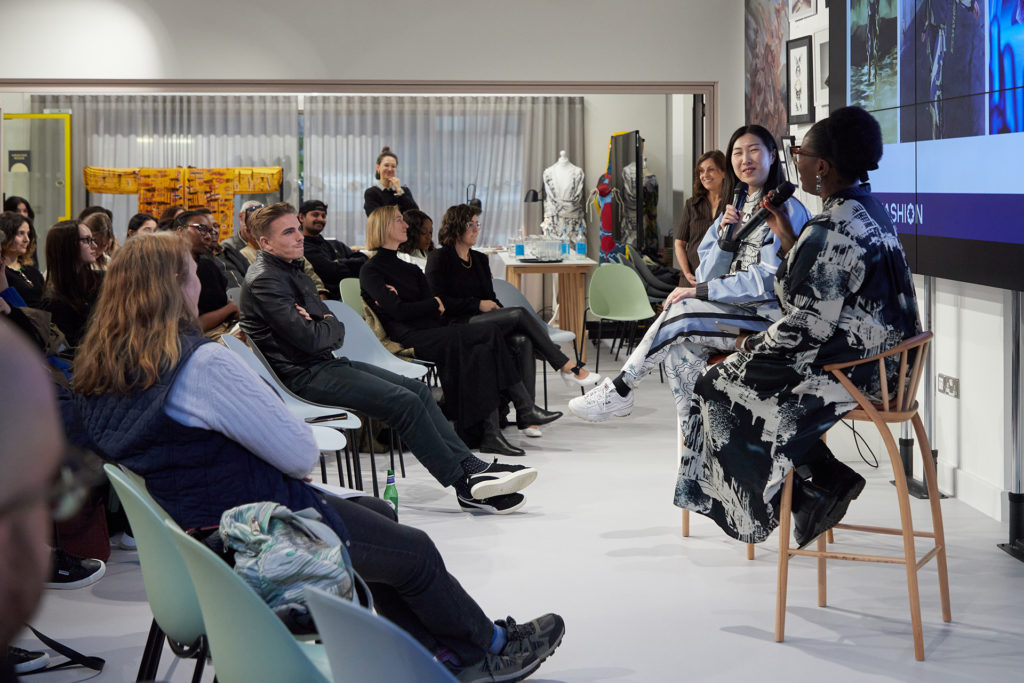
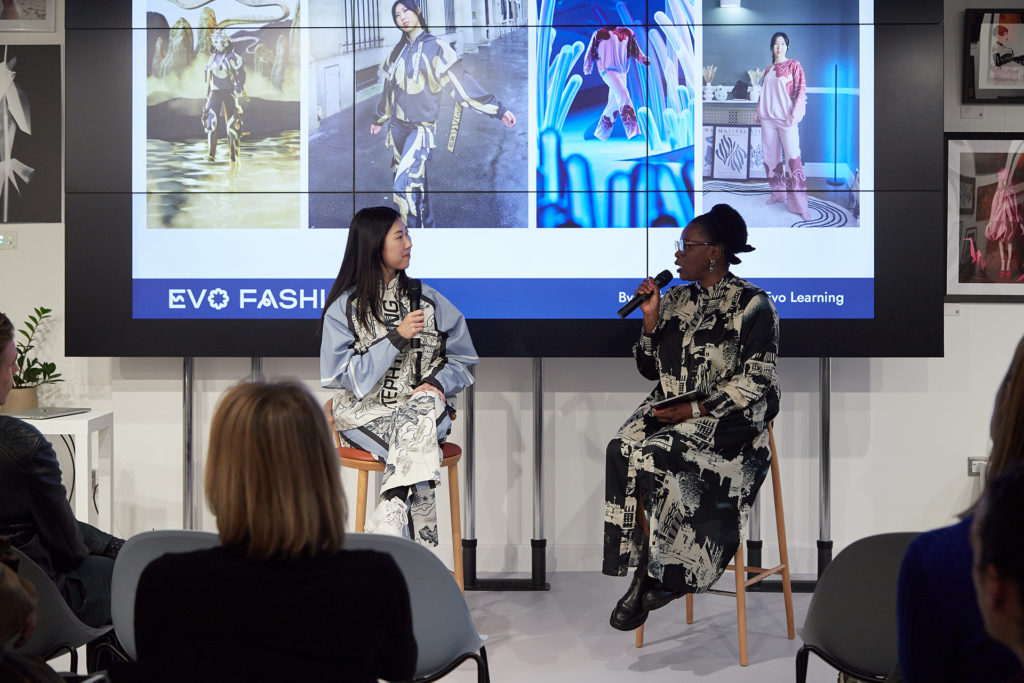
After a quick interval where attendees tucked into delectable canapes and grabbed a drink at the free bar, we were back for another conversation hosted by Muchaneta Ten Napel with Shana Chu, Founder of Tailr, who hopes to redefine garment production by using AI technology.
Having worked as a brand technologist for a number of years, Shana saw first-hand how disconnected brands were from their supply chains. ‘A lot of things get lost in translation,’ said Shana, ‘which is where I got the idea for my business.’
‘Essentially, we digitise the nuances of how the fabric is actually created. We get down to the yarn, the composition, the finishing, the spinning, the weaving, the make of the machine, the tension, the density of the yarn. We even look at where the yarn came from – for example, how was the cotton grown? How was the season? Are things consistent from last season? How is all of that going to affect production for the brand?’
‘Ultimately we aim to reduce waste by making sure nothing goes wrong. Did you know, on average, 20% of production comes in wrong for brands? That 20% is often shipped to landfill. Our goal is to remove that element and we will do that by ensuring that things are perfect at factory level.’
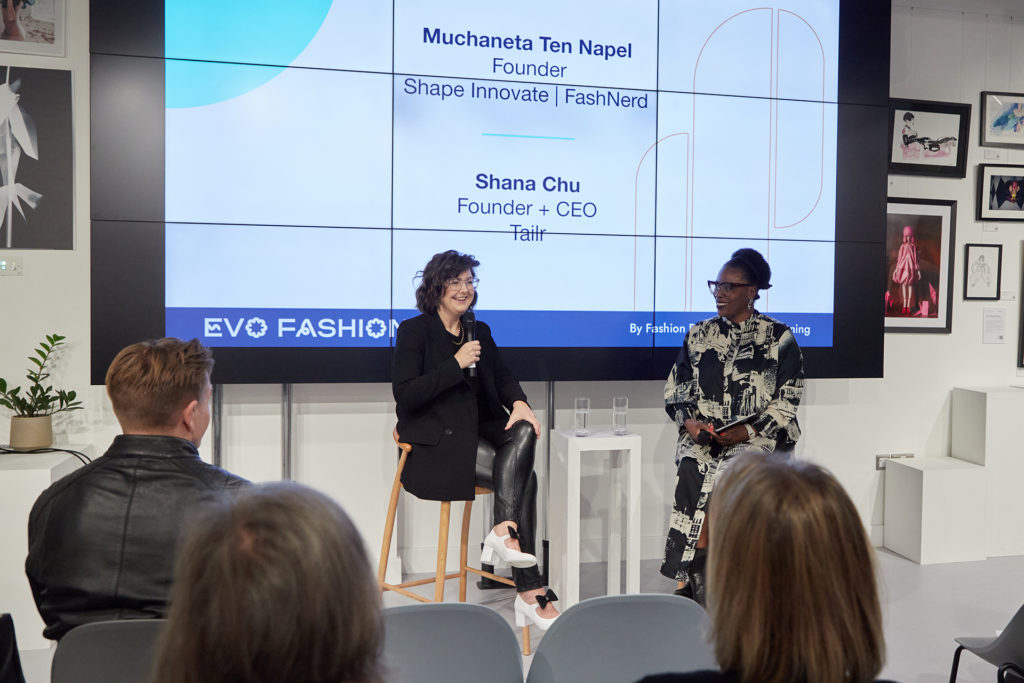
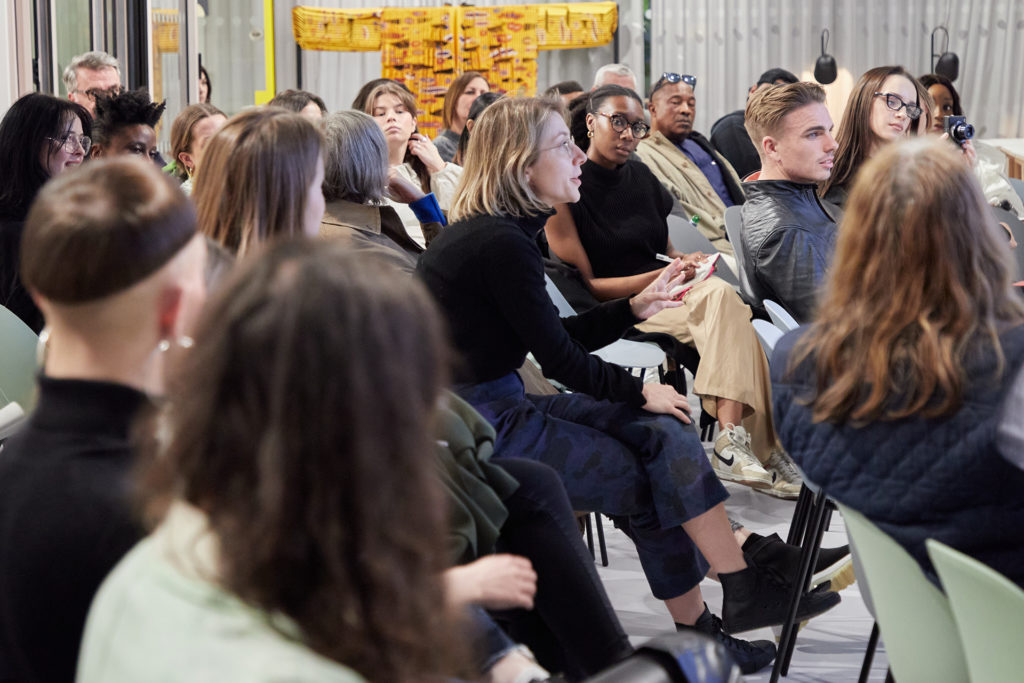
Offering advice for emerging brands and startups, Shana said, ‘Don’t be bullied when you know what’s best for your company. It’s important that you have the guts to say no, I don’t want to do it that way. When you’re starting out, you try to listen to all the advice people want to give you, but it can be overwhelming. Listen to what resonates with you.’
When asked by Muchaneta about emotional challenges she faced, such as imposter syndrome, Shana responded candidly, saying, ‘You know that saying ‘fake it til you make it’? It did help. Sometimes I do have to pretend that I’m super confident. But what I’ve learnt along the way is this: don’t be shy of your vision, don’t be afraid to be ambitious, and don’t be afraid to sell what you want. If AI has done anything, it’s shown us that those big visions are absolutely possible.’
From securing £700,000 as a sole female founder, to assembling a team of eight people and presently raising £5 million, Shana’s insight on funding was invaluable. ‘Before you get to the investor stage, try to take part in competitions. I won the best new startup company in Ireland and I got £50,000. I got that to build my MVP. You don’t necessarily need to go straight to investors to get funding. There are a lot of opportunities out there.’
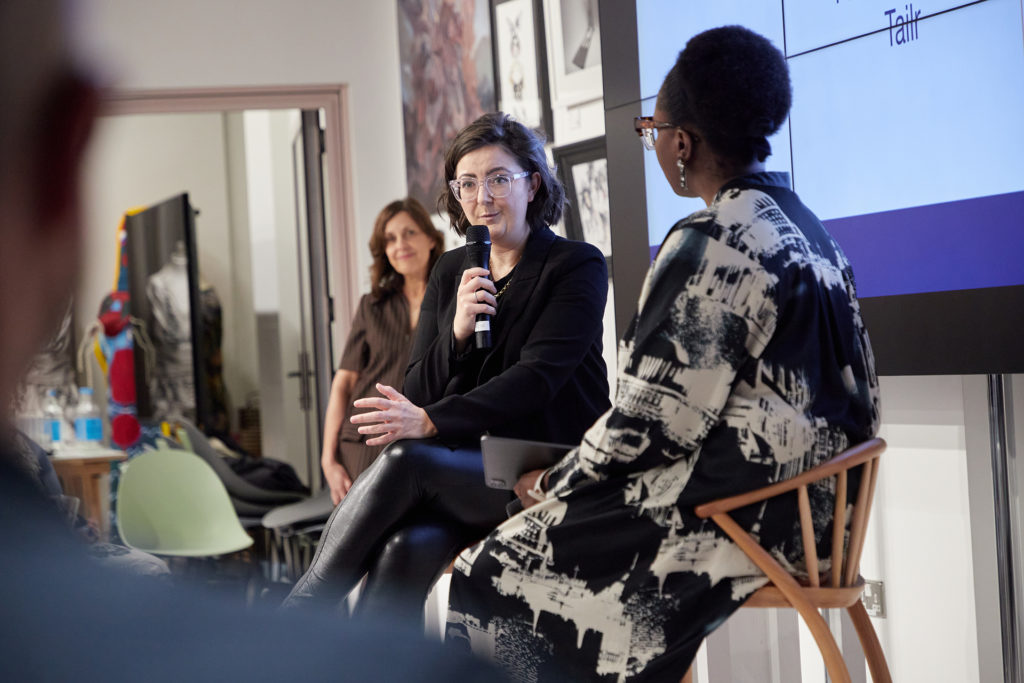
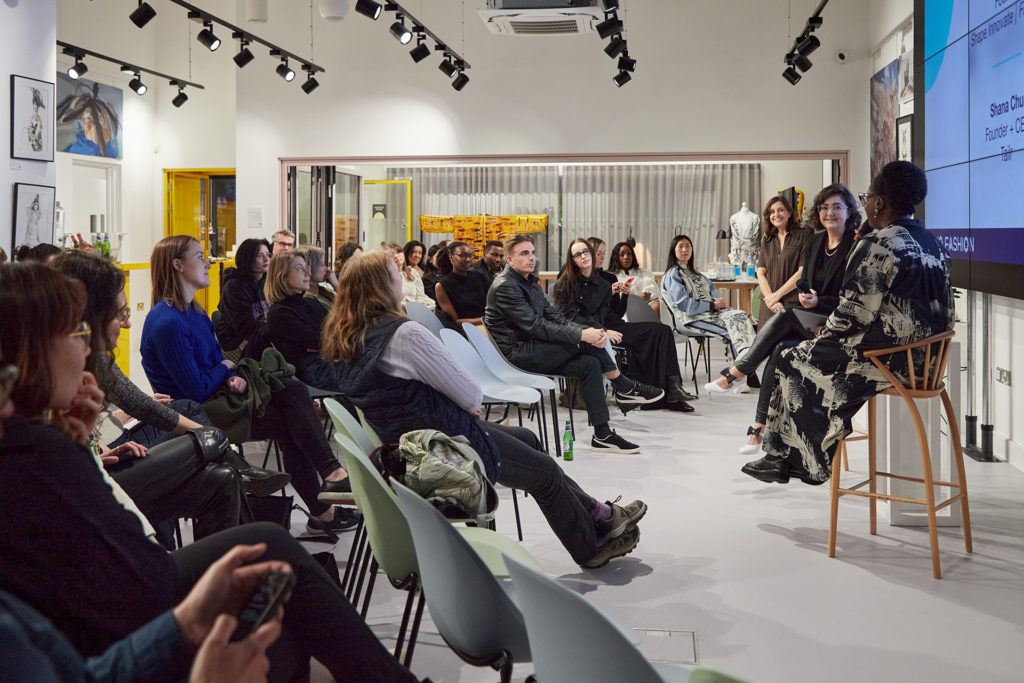
To conclude the evening, Helen Lax, Director of Fashion District, took to the stage to present a comprehensive overview of the Evo Fashion programme.
Designed to fit in with work commitments and delivered by experts, the fully-funded five-month programme consists of a two-day intensive launchpad and four full-day masterclasses which will focus on different aspects of learning, including environmental and ethical practice, business and financial planning, marketing and storytelling, founder wellbeing, sustainable growth and much more.
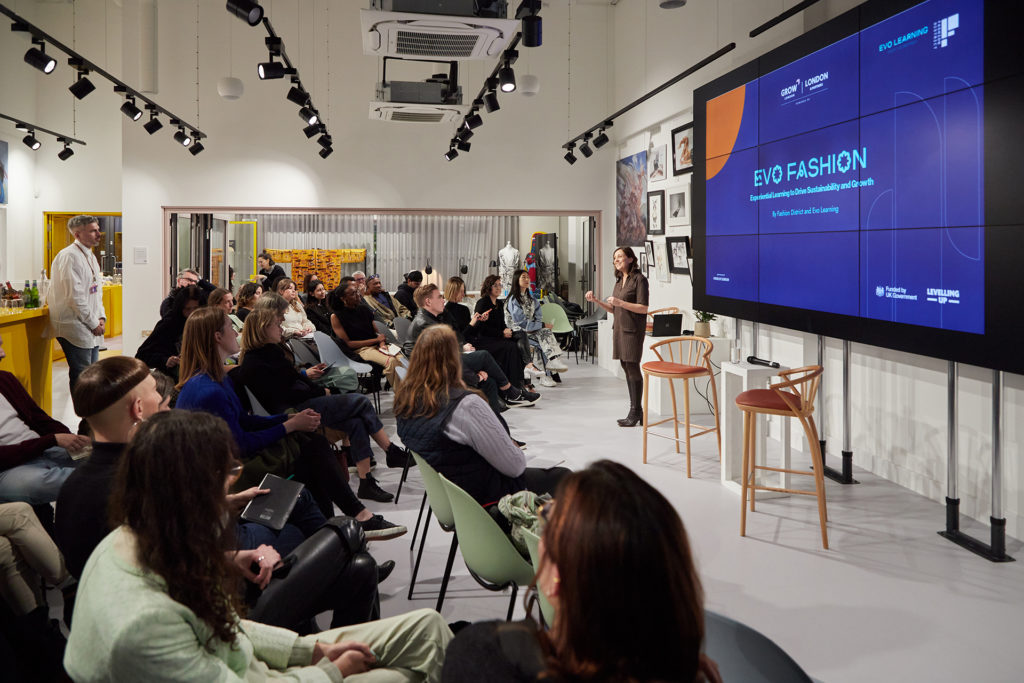
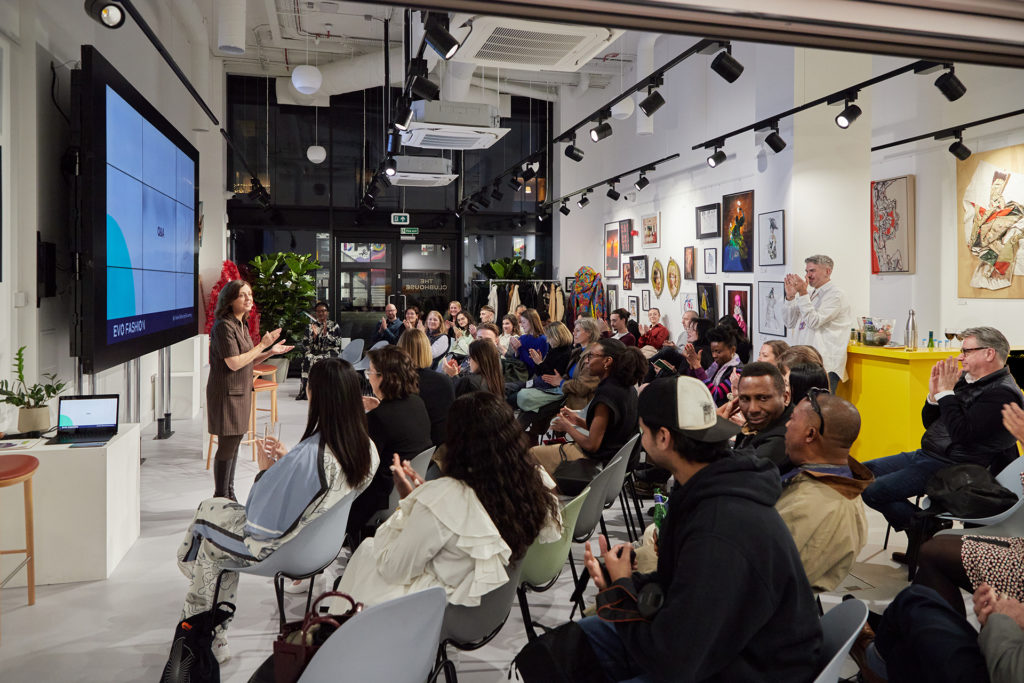
‘Peppered in amongst the sessions and masterclasses,’ Helen told the audience, ‘there will also be panels and talks, a 1-2-1 business diagnostic, three peer-to-peer learning workshops, a creative photoshoot, and the chance to present your brand at an industry showcase.’
‘To be eligible you must be a registered business based in London. You must employ 2-5 people and you must have been trading for 18 months,’ said Helen. ‘You must also have turnover or investment of a minimum of £50k in the last financial year. If you’re unsure about whether you’re eligible, please get in touch with the Fashion District team.’
With an incredible selection panel for the second cohort, including Brooke Roberts-Islam, Founder of Techstyler; Tom Adeyoola, Entrepreneur, Investor and Advisor; Lisa Chatterton, Business Manager, Fashion Innovation Agency; Charles Armstrong, CEO of The Trampery, and Helen Lax, Director of Fashion District, applications are now open and will close at midnight on 3rd June 2024.
Find out more and apply for the second round of Evo Fashion now via the button below.
Got a question? Please get in touch with us at fashion@evolearning.co with any queries about the programme, content, facilitators, application form, and eligibility.
Want to stay informed about the latest developments in the Evo Fashion programme? Subscribe to the Evo Fashion newsletter:
